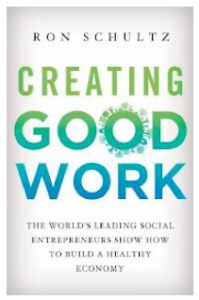Shifting From ‘Scale’ to ‘Reach’
By Ron Schultz, founder and President of Entrepreneurs4Change
- Ron is appearing in the SEWF 2103 main stage plenary "The Future of Social Enterprise: Authors Panel”.
- People who find this article of interest may enjoy the SEWF 2013 program streams on Social Innovation and Cross Boundary Collaboration.
- This article originally appeared on The Corporate Social Responsibility Newswire, a wonderful digital media platform and the leading global source of corporate social responsibility (CSR) and sustainability news.
- The feature picture of this article is courtesy of Findr / A Flickr Search Tool.
 All rights reserved by James Neeley
All rights reserved by James Neeley
I have spent the last dozen years of my life dedicated to the world of social entrepreneurship and helping social entrepreneurs become more successful in their endeavors. And, if you ask my very patient wife, it has not been as financially rewarding as it has been Karmic-ly worthwhile. But make no mistake; it has been incredibly worthwhile and rewarding work.
And with the recent publication of Creating Good Work – The World’s Leading Social Entrepreneurs Show How to Build a Healthy Economy, I am starting to attain a certain recognition within the community, which is greatly appreciated and highly valued. And having gained this perception from my colleagues and peers, I find it necessary to apply to myself what Craig Dunn, at Western Washington University, so aptly coined in CGW and what social entrepreneurship is all about: Deliberate Disruptive Design.
Over the last two decades, social entrepreneurship has grown and begun to mature… well, many of the early social entrepreneurs have certainly begun to mature.
And with that maturation, new innovative approaches have surfaced.
Shift Away From Individualism To Collaboration
 There is no question in my mind that the must-do role of the social entrepreneur is a critical step in the process. But in our justifiable need to venerate these early adherents and their amazing accomplishments, we have begun to stray away from what will make this work even more effective and successful.
There is no question in my mind that the must-do role of the social entrepreneur is a critical step in the process. But in our justifiable need to venerate these early adherents and their amazing accomplishments, we have begun to stray away from what will make this work even more effective and successful.
And from my perspective, that is a distinct shift from the rugged individualist we call a social entrepreneur, to the rugged collaborationist, or members of Social Innovation Collaboratives.
If -- as Todd Khozein, Carrie Freeman, Michael Karlberg and Ron Garan insist in Creating Good Work -- collaboration is our only real hope to attain the kind of reach we are seeking to solve our social challenges, then continuing to focus and proclaim the lone and heroic efforts of individuals goes against the tide.
Social Innovation Collaboratives certainly contain social entrepreneurs, but they also include many others who share the vision of the common good, but may not be as entrepreneurial.
And that is good and necessary evolution.
In moving from social entrepreneurship and the 17th century inspiration of the rugged-individualist conquering the wilderness, Social Innovation Collaboratives are the logical next step into the future. We can’t do this alone and affect the reach we require.
Social Innovation Reaches Rather Than Scales
 That is a very specific choice of words. One of the driving forces behind social entrepreneurship has been this notion of scale. Will the idea scale? Like the rugged-individualist, scale is a concept from another century. Scale is an industrial age term that applies to mechanical processes.
That is a very specific choice of words. One of the driving forces behind social entrepreneurship has been this notion of scale. Will the idea scale? Like the rugged-individualist, scale is a concept from another century. Scale is an industrial age term that applies to mechanical processes.
Social Innovation is not a mechanical process, but a complex relation-based undertaking. It is not a linear network, either. If anything, it is a cloud of interaction that is far less ordered than a network and far more fluid. It spreads. Our human connections may feel like a network, because we encounter a series of connections and they seem as if they are happening linearly, but again, the continuity can only be seen when we look back, not as we move forward.
And within that cloud of complex interactions, we stretch, reach, reform, combine and collectively join together to rain down and bring renewal. We can only reach the ground and bring the vitality and re-vitality toward which we endeavor by joining together, and forming Social Innovation Collaboratives.
The fact is, this is how it has always been done.
We find our partners, our co-conspirators for good, and we get to work.
This is not to say that an individual can’t have a profound impact on the process but our true success as a global effort comes in, well, our global collective efforts together.
Building Social Innovation Collaboratives
We need to consciously begin creating Social Innovation Collaboratives, that have at their core not the veneration of the individual, but the salvation of our society. It is together, as social innovation collaborators, that we can reach our goals.
And in this reformulation process, we don’t have to exhaust ourselves trying to lift the burdens we face, alone. We aren’t made for that kind of Herculean labor. We simply aren’t as effective alone as we are when we join together as a social unit reaching far into our societies, to shift the often un-shifting with our collective effort.
So social entrepreneurs: don’t let go of your vision, but do let go of your need to do it alone.
We don’t need a gazillion social entrepreneurial efforts vying for the same scant resources and accomplishing only a bit of the picture because the focus settles on the idea that “I have to do it” rather than “only we can do it together.”
Social Innovation Collaboratives find funding together, share capacity together, reach deeper and further together, and accomplish more together.
More than we can ever hope to accomplish alone.
More about Ron Schultz
Schultz is the founder and President of Entrepreneurs4Change. The enterprise works with green and social businesses, veterans, and marginalized communities providing entrepreneurial education, access to funding and capital, and ongoing nurturing and support for the businesses once they are operating. His new book – Creating Good Work – The World’s Leading Social Entrepreneurs Show How to Build a Healthy Economy was released by Palgrave Macmillan in Feburary, 2013. He has written or co-written and had published 22 previous books. His last book, Coherence in the Midst of Complexity, written with Hugo Letiche and Michael Lissack, was published by Palgrave-Macmillan in January, 2012. Other books include: Adjacent Opportunities – Sparking Emergent Social Action (Emergent Publications, Impact Books, 2010) Unconventional Wisdom (HarperCollins, 1994); Open Boundaries: Creating Business Innovation through Complexity, (with Howard Sherman) (Perseus Books, 1998); and The Mindful Corporation: Liberating the Human Spirit at Work, (with Paul Nakai) (Leadership Press, 2000).
Tags: Collaboration, Ron Schultz, SEWF Speakers, Social Innovation, Sustainability







